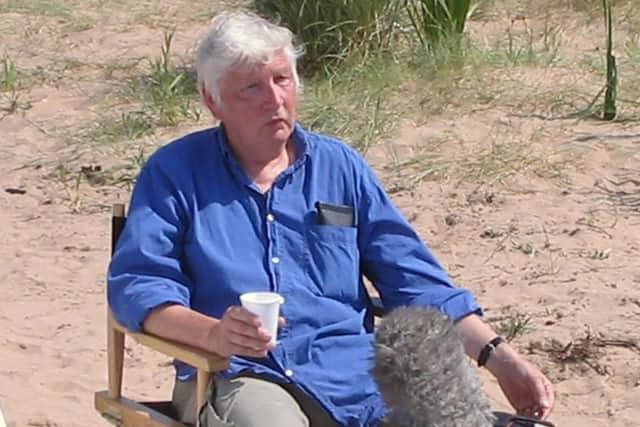Obituaries: Gavin Millar, Scots filmmaker who worked with Dennis Potter
There was a time when Gavin Millar was so ubiquitous presenting arts programmes such as Arena and Talking Pictures that the Monty Python team featured a highbrow critic of that name in one of their sketches, pontificating on the merits of a playwright called Neville Shunt, the content of whose work appears to be train schedules.
“Some people have made the mistake of seeing Shunt's work as a load of rubbish about railway timetables, but clever people like me, who talk loudly in restaurants, see this as a deliberate ambiguity, a plea for understanding in a mechanised world,” says the character, played by John Cleese.
Advertisement
Hide AdAdvertisement
Hide AdThe real Gavin Millar trod the boards at Oxford in a student production of The Tempest with Melvyn Bragg and he came up through the ranks of the fledgling BBC2 in the mid-1960s.


He might have seemed like the epitome of the chattering classes, but Millar actually came from a working class background in Clydebank. His parents both worked in the Singer sewing machine factory before moving to the Midlands when Millar was just a boy.
Millar was seemingly highly amused at being immortalised by the Pythons and went on to develop a career as a director in film and television dramas, working with Dennis Potter and Alan Bennett.
And in his sixties he returned to his home town of Clydebank to shoot a scene in Complicity, his film version of the Iain Banks novel, starring Jonny Lee Miller as a journalist who gets caught up in the series of murders of corrupt high-profile individuals.
After the move to England Millar went to school in Birmingham, he did National Service in the RAF, studied English at Christ Church Oxford and film at Slade School of Fine Art in London. He began working in television in the early 1960s, on programmes that included the current affairs show Tonight and the satirical That Was The Week That Was. The launch of BBC2 in 1964 offered fresh opportunities, presenting, directing and producing various arts shows.
“I was lucky to get into the BBC at the time BBC2 was opening up,” he said. “The atmosphere was much freer. You could do daft things without being hauled in front of three accountants. It was a much more experimental time.”
He made documentaries on Federico Fellini, Bauhaus and Muriel Spark and wrote reviews for The Listener, Sight and Sound film magazine and the London Review of Books.
He first worked with writer Dennis Potter on the 1980 television drama Cream in my Coffee, starring Peggy Ashcroft and Lionel Jeffries as a jaded married couple returning to the Eastbourne hotel where they spent a passionate weekend as young lovers. Ashcroft won a Bafta award for her performance.
Advertisement
Hide AdAdvertisement
Hide AdMillar and Potter collaborated again five years later on Dreamchild, with Coral Browne as the elderly Alice Liddell reflecting on childhood and her relationship with Charles Dodgson aka Lewis Carroll, who used her as the basis for Alice in Alice’s Adventures in Wonderland. The film also featured characters from the book, including the Mad Hatter and March Hare, which were realised in disturbing form by Jim Henson’s puppet company. Millar insisted they look like something from a nightmare.
“I don’t think there is any question but that [Carroll] was in love with Alice and in every possible sexual way, but without any physical contact,” said Millar.
“He turned all that passion and emotion into his books, and what she finally grasps is that, whatever the source of that love, it had been expressed in a beautiful manner.”
The film got caught up in industry politics and legal wrangling and received only a very limited release, but it was hailed by critics and featured in several lists of the best films of the year.
Suddenly Millar was inundated with offers from Hollywood, including the chance to direct the offbeat comedy Beetlejuice, but there was nothing that he felt sufficiently passionate about to prompt him to relocate across the Atlantic and then the offers dried up just as quickly as they had started.
“If you are hot one week, you get hit with lots of scripts,” he said. “Then you are finished. Perhaps I should have swallowed my pride and made something silly.”
Instead Millar directed a television adaptation of Evelyn Waugh’s satirical novel Scoop, with Denholm Elliott; a film of Roald Dahl’s Danny, The Champion of the World, with Jeremy Irons; A Murder of Quality, with a script from John le Carre and Elliott as his spy George Smiley; Pat and Margaret, with Victoria Wood and Julie Walters as sisters; and the instalment of Alan Bennett’s Talking Heads that featured Wood as the wife of a murder suspect.
His return to his native land from his adopted home of Islington for a television adaptation of Iain Banks’s novel The Crow Road and then a big-screen version of Banks’s Complicity in 1999 marked a move also towards much darker material. “It’s the first time I’ve been able to deal with really, really hard material,” said Millar. He had to tone down some of the details from the novel.
Advertisement
Hide AdAdvertisement
Hide AdMillar’s wife Sylvia died in 2012. He is survived by their five children and six grandchildren.
OBITUARIES
If you would like to submit an obituary (800-1000 words preferred, with jpeg image), or have a suggestion for a subject, contact [email protected]
A MESSAGE FROM THE EDITOR
Thank you for reading this article. If you haven't already, please consider supporting our trusted, fact-checked journalism by taking out a digital subscription. Click on this link for more details.
